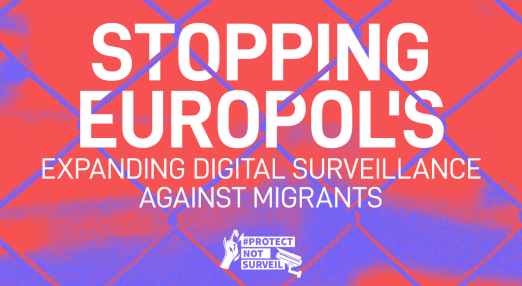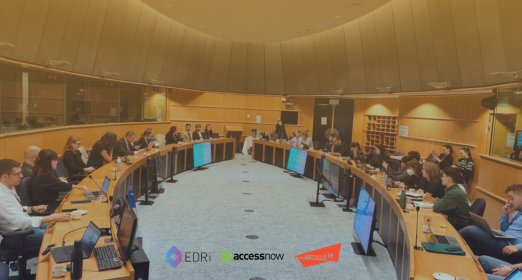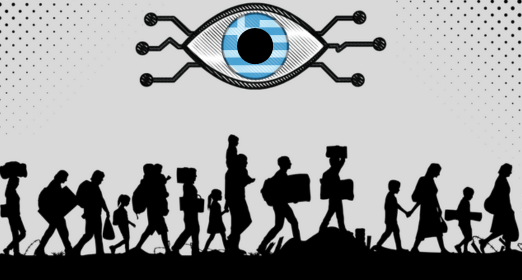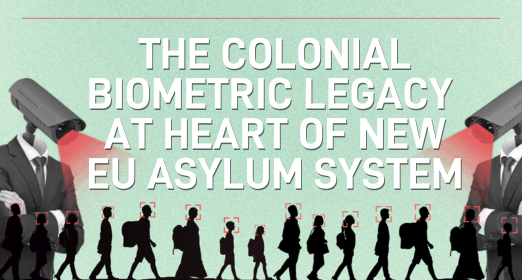Protect Not Surveil position paper: Stop Europol’s expanding digital surveillance against migrants!
EDRi and the Protect Not Surveil coalition published position paper today to call for the rejection of the Europol reform. The proposed legislation would expand Europol’s surveillance powers, put lives at risk, and criminalise migrants and solidarity organisers.
Filter resources
-

Protect Not Surveil position paper: Stop Europol’s expanding digital surveillance against migrants!
EDRi and the Protect Not Surveil coalition published position paper today to call for the rejection of the Europol reform. The proposed legislation would expand Europol’s surveillance powers, put lives at risk, and criminalise migrants and solidarity organisers.
Read more
-

Pre-travel controls: Digitalising travel documents
We are responding to a public consultation on the European Commissions’ digitalising travel documents proposal. This proposal promises convenience in travel but could pave the way for biometric mass surveillance and automated discrimination.
Read more
-

Non-fitted devices in the UK Home Office’s surveillance arsenal: Investigating the technology behind GPS fingerprint scanners
Privacy International’s technical research on the so-called non-fitted devices (NFDs) used by the UK Home Office to track migrants shows that these devices are intrusive and stigmatising by design. The use of NFDs is an expansion beyond the use of GPS ankle tags of the UK’s surveillance of migrants who are on immigration bail and subject to electronic monitoring conditions.
Read more
-

German federal health minister, Shein and Deutsche Bahn ‘awarded’ for worst privacy and data protection offences
In October 2024, EDRi member Digitalcourage held the annual gala for the German BigBrother Awards. The unfortunate “winners” included a minister in the federal government, the police and interior minister in one German state, two international online retailers, a fundamental infrastructure provider and a trend.
Read more
-

EDRi and members take EU decision-makers through 20 years of digital policy
This September, EDRi, Access Now and ARTICLE 19 took Parliamentarians through a rollercoaster ride of all things digital policy in the European Union. From the early internet and initial experiments in platform regulation, through more recent regulatory innovations, and finally to questions of security and surveillance, we shared a digital rights perspective of the good, the bad and the ugly of digital policy in the EU.
Read more
-

Biometric surveillance in the Czech Republic: the Ministry of the Interior is trying to circumvent the Artificial Intelligence Act
EDRi-member Iuridicum Remedium draws attention to the way biometric surveillance at airports should be legalised in the Czech Republic. According to the proposal, virtually anyone could become a person under surveillance. Moreover, surveillance could be extended from airports to other public spaces.
Read more
-

Surveilling Europe’s edges: when digitalisation means dehumanisation
In May 2024, Access Now’s Caterina Rodelli travelled across Greece to meet with local civil society organisations supporting migrant people and monitoring human rights violations, and to see first-hand how and where surveillance technologies are deployed at Europe’s borders. In the first of a three-part blog series reflecting on what she saw, Caterina explains how, all too often, digitalising borders dehumanises the people trying to cross them.
Read more
-

Statement: EU takes modest step as AI law comes into effect
The EU Artificial Intelligence (AI) Act will finally come into force on August 1, 2024. While it's disappointing that the final law did not put people and their rights at the centre, it still contains some silver linings.
Read more
-

EDRi and Reclaim Your Face campaign recognised as Europe AI Policy leaders
EDRi and the Reclaim Your Face coalition were recognised as the Europe AI Policy Leader in Civil Society for our groundbreaking work as a coalition to advocate for a world free from biometric mass surveillance.
Read more
-

How to fight Biometric Mass Surveillance after the AI Act: A legal and practical guide
The EU's Artificial Intelligence Act has been adopted, laying out an in-principle ban on live mass facial recognition and other public biometric surveillance by police. Yet the wide exceptions to this ban may pave the way to legitimise the use of these systems. This living guide, for civil society organisations, communities and activists, charts a human rights-based approach for how to keep resisting biometric mass surveillance practices now and in the future
Read more
-

Greek Ministry of Asylum and Migration face a record-breaking €175,000 fine for the border management systems KENTAUROS & HYPERION
On 3 April, the Greek Data Protection Authority (DPA) slapped the Ministry of Asylum and Migration with a record-breaking €175,000 fine under the General Data Protection Regulation for the border management systems KENTAUROS and HYPERION. The DPA’s investigation started back in 2022, following a strategic complaint filed by the EDRi member Homo Digitalis and its partners in Greece.
Read more
-

The colonial biometric legacy at heart of new EU asylum system
On Wednesday (10 April), the EU is set to vote on a new set of asylum and migration reforms. Among the many controversial changes proposed in the new migration pact, one went almost unnoticed — a seemingly innocent reform of the EU's asylum database, EURODAC. Although framed as purely technical adjustments, the reality is far more malicious. The changes to EURODAC will massively exacerbate violence against people on the move.
Read more
